Agave scabra
Rough-leaved Agave
This is a common Agave in its native Chihuahuan Desert. Several subspecies can also be seen in the wild. The wide, thick leaves are edged with teeth that recurve (curve back) toward the center of the plant rosette. Sharp terminal spine. The backs of leaves have a rough texture, thus its name. Canopy coverage: 13 square feet.
[Read More]Agave schidigera
Thread-leaf Agave
Requires some TLC in desert climates; avoid planting in direct sun. Interesting fibers curl along the leaf edges. The selection 'Durango Delight' (described here) is more compact and symmetrical. Canopy coverage: 7 square feet.
[Read More]Agave schidigera 'Durango Delight'
Durango Delight Agave
This selection is a popular compact and symmetrical agave, adapted to all locations in the landscape. Leaf edges are smooth but leaf tips end in a sharp spine. Fibers add interest as they curl along the leaf edges, which are edged in white. Canopy coverage: 7 square feet.
[Read More]Agave shawii
Shaw's Agave, Coastal Agave
This Agave is dramatic in its appearance due to its prominent spines and spine colors. Upright rosette growth habit. Individual plants grow to about 2 feet wide but plantings spread due to suckers at the base of plants. Necessary to provide plants with some shade in hot desert climates. Does not like summer irrigation. Canopy coverage: 7 square feet.
[Read More]Agave victoriae-reginae
Queen Victoria Agave
Primary attraction of this Agave is the white margins along the leaves, becoming part of the intricate leaf patterns. The result is quite a striking plant. Recommended for up-close viewing due to its small size and highly interesting features. Best with some shade in hot-summer climates. Blooms appear on tall spikes but it may be years before plants flower. Canopy coverage: 3 square feet.
[Read More]Agave vilmoriniana
Octopus Agave
Form is an open rosette with multiple leaves that splay out, reminding one of an octopus. Plant is soft to look at and to the touch, with bendable terminal thorns. Canopy coverage: 20 square feet.
[Read More]Agave weberi
Weber's Agave
The form of Weber's Agave is an open rosette. Sharp tips and large mature size requires careful placement in home landscapes, well away from entries, walkways and outdoor living areas. Canopy coverage: 20 square feet.
[Read More]Aloe 'Blue Elf'
Blue Elf Aloe
Unlike many Aloes, 'Blue Elf' tolerates tough conditions of full sun and reflected heat. The small, fleshy leaves grow upright in a clump. Orange-red flowers bloom on top of stalks. Canopy coverage: 3 square feet.
[Read More]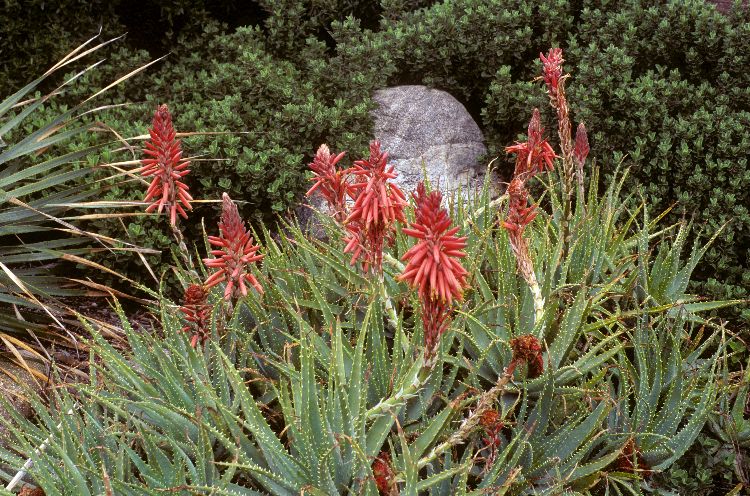
Aloe arborescens
Tree Aloe
This shrublike succulent requires a lot of space to grow, so locate plants carefully. Swordlike leaves reach up to 2 feet long and are toothed along the margins. They are typically gray-green but can also be found in shades of green. Flowers of the species are reddish orange; yellow selections are available. Canopy coverage: 28 square feet.
[Read More]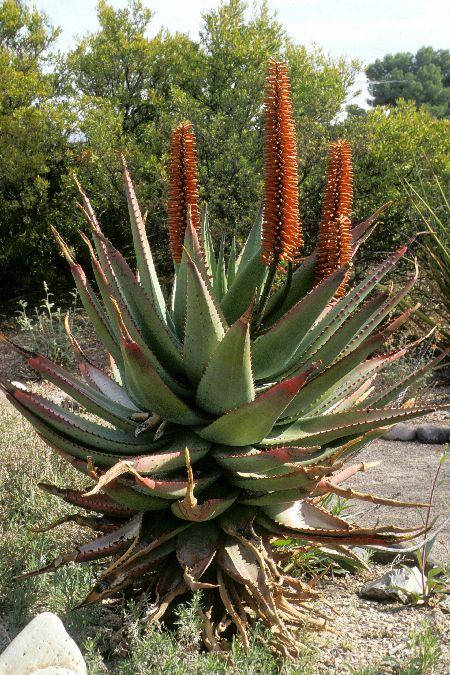
Aloe ferox
Cape Aloe
The slow growing Ferox Agave becomes quite large with time, so locate carefully. The large, dramatic flowering stalks are definitely eye-catching. Canopy coverage: 20 square feet.
[Read More]Aloe striata
Coral Aloe
A spreading succulent with large, thick, fleshy leaves that sport a thin, orange margin. Coral-red flowers are borne candelabra-style on wide-branching stems 2 feet above the leaves. Provide with well drained soil. Providing regular water will produce a plumper plant, but it will look acceptable with little. Canopy coverage: 3 square feet.
[Read More]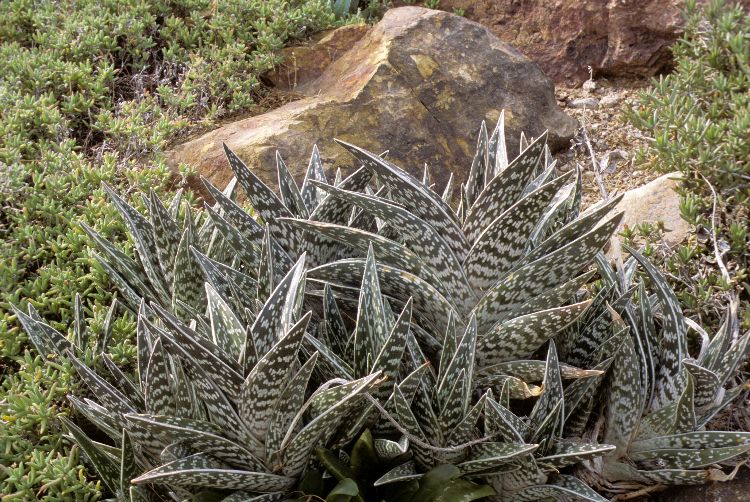
Aloe variegata
Variegated Aloe
This Aloe is an attractive plant for small spaces and close-up viewing. Fleshy leaves are medium to dark green, with an interesting spotted pattern. Best with some shade. Canopy coverage: 1 square foot.
[Read More]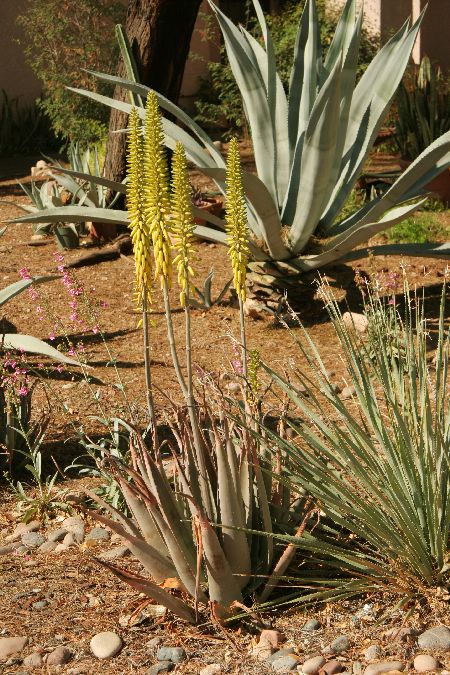
Aloe vera
Aloe Vera
Another common name for Aloe Vera is Medicinal Aloe, famous for treating burns and scrapes. Canopy coverage: 7 square feet.
[Read More]
Asclepias linearis
Threadleaf Milkweed
Threadlike leaves align along multiple upright stems to create an airy, shrublike, clumping form. Clusters of small white flowers bloom from the ends of branches. Use as an accent or backdrop in an arid landscape. Canopy coverage: 7 square feet.
[Read More]Asclepias subulata
Desert Milkweed
This succulent is an accent plant that provides a vertical element in the landscape. The upright stems have a fleshy composition. Canopy coverage: 7 square feet.
[Read More]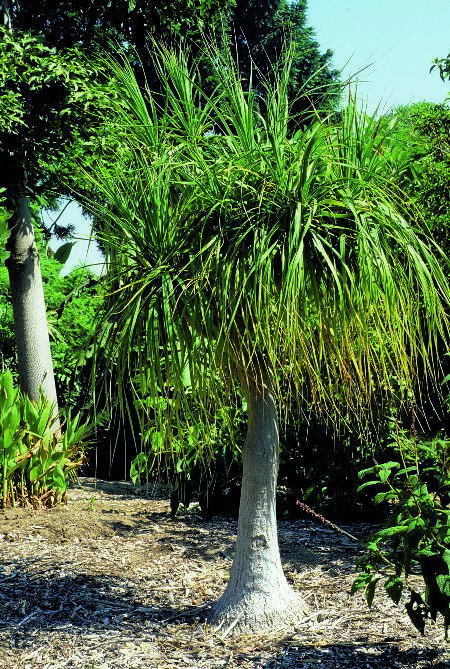
Beaucarnea recurvata
Ponytail Palm
Be aware this plant is slow growing as well as sensitive to cold below 30F. Often grown as a houseplant in a container—brought indoors when cold threatens, then taken back outside after danger of frost has passed. Long, strap-shaped leaves drape downward from the top of the branches. The broad base of the trunk is the finishing touch for an interesting and unique accent specimen. Canopy coverage: 113 square feet.
[Read More]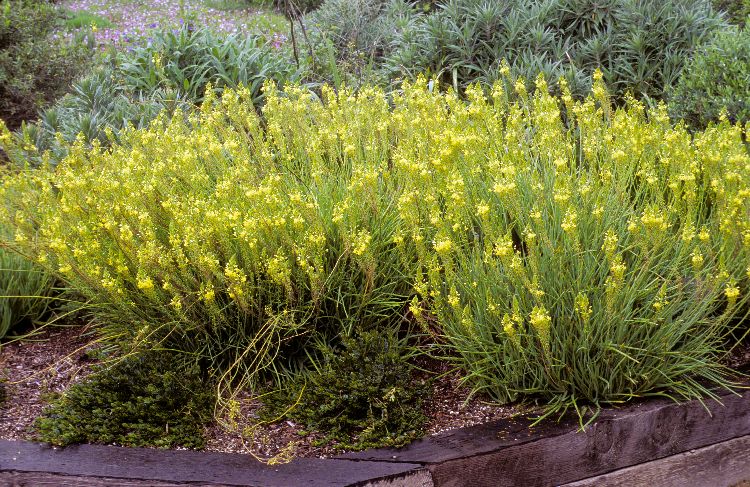
Bulbine frutescens
Yellow Bulbine
Yellow Bulbine has a clumping growth habit that can spread to become a colorful groundcover. Flowers bloom on spikes above the narrow leaves. Spreads by underground stems. Canopy coverage: 3 square feet.
[Read More]
Cephalophyllum 'Red Spike'
Red Spike Iceplant
This succulent grows to about 6 inches high and spreads to 1-1/2 feet wide. Excellent for small space coverage. Locate where plants will receive some afternoon shade in hot summer regions. Canopy coverage: 3 square feet.
[Read More]Crassula ovata
Jade Plant
Jade Plant is a popular and easy to grow succulent that can reach medium-sized shrub proportions. Also grown as a easy-care houseplant in regions with freezing temperatures. A fine candidate for container culture outdoors, then move to shelter before winter cold comes on. Easy to propagate from leaf cuttings. Supply with well-draining soil and do not overwater. Canopy coverage: 13 square feet.
[Read More]
Cycas revoluta
Sago Palm
Growth rate of Sago Palm is very slow. It is an excellent plant for viewing up close, valued for its subtropical effect. Brown cones appear in spring. Provide a protected location such as a entry or patio to show it off and to avoid frost and intense sun damage. Canopy coverage: 20 square feet.
[Read More]
Dasylirion acrotriche
Green Desert Spoon
This quality accent plant is quite similar to Desert Spoon, only it has bright green leaves. It evokes more of a subtropical appearance. Flowers bloom on tall stalks several feet high. Leaf stalks are armed with sharp teeth so plant away from traffic areas. Canopy coverage: 20 square feet.
[Read More]